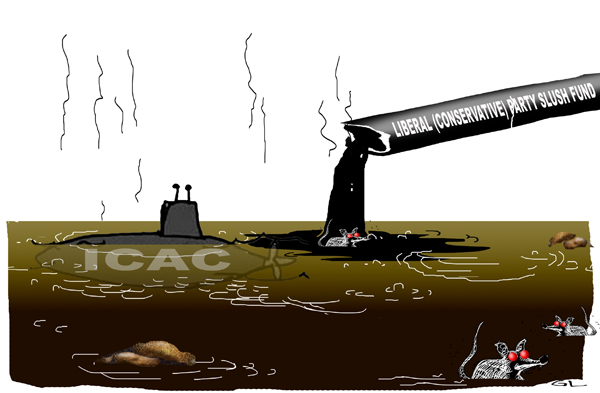Search
Democracy Links
Member's Off-site Blogs
trust who ....

The New South Wales government has been accused of running a poker machine “slush fund” after it emerged that a $20m pool of club profits was spent overwhelmingly on community projects in Coalition electorates or to pay for Liberal-National party election promises.
The ClubGrants Category 3 fund was established in 2011 in line with a memorandum of understanding (MOU) signed between the NSW Liberals, the Nationals and Clubs NSW the year before.
In exchange for higher tax rebates, the clubs industry agreed to direct a fraction of its profits into the Category 3 fund, the money earmarked to be spent on “large-scale projects associated with sport, health and community infrastructure”.
A second, updated version of the MOU was signed this month.
An auditor general’s report in 2013 found that in the program’s first year of operation, the money in the pool, amounting to $8m, had been spent at the discretion of the gaming minister without proper oversight, and only on fulfilling Liberal-National party election promises.
In 2013 and 2014, $12.4m was allocated by the program to community projects. Guardian Australia can reveal that all but one of the projects was in a Liberal-National party seat.
These included $2m spent on a sporting venue in Gosford (in an electorate held by Liberal Chris Holstein), $1.6m to upgrade Clifford Park in Lismore (held by the Nationals’ Thomas George) and more than $1m on a surf lifesaving club in Port Macquarie (held by the Nationals’ Leslie Williams).
The one project funded outside a Coalition electorate was an upgrade to the PCYC in Cessnock, held by Labor’s Clayton Barr on a margin of less than 4%. The former Rose Tattoo frontman Angry Anderson will contest the seat for the Nationals at the election in March.
Following the auditor general’s report, the government appointed an independent committee to oversee the grants. A spokeswoman for the gaming minister and deputy premier, Troy Grant, said that all 10 grants made in 2013 and this year were decided by the committee.
Labor’s gaming spokesman, Steve Whan, said the government appeared to be using the Category 3 pool as a “slush fund for political purposes”.
“I have had concerns about Category 3 for some time. The government for a considerable length of time did not set up a committee to advise them on spending the money,” he said.
“I would think the auditor general should look at it again.”
John Kaye, the Greens gambling spokesman, said the use of the fund exemplified the “cosy relationship between Clubs NSW and the Coalition”.
“It’s a mutual back-scratching society where they are prepared to provided benefits for clubs in return for political expediency,” he said.
Other measures outlined in the 2010 MOU, and subsequently passed by the Coalition government, include reducing taxes for big clubs, easing restrictions on virtual casino-game terminals and scrapping barriers that hindered pubs and clubs from moving poker machines to more profitable areas.
Among the commitments in the updated MOU, released last week, the NSW government has agreed in its next term to “consider” allowing venues to use ClubGrants money to establish and run childcare and aged-care facilities, in line with Clubs Australia’s controversial submission to the productivity commission’s childcare inquiry.
The government has also agreed to allow clubs to pay out up to $5,000 in winnings in cash rather than cheque, while reducing the amount of cash that can be inserted into machines from $10,000 to $7,500.
NSW operates about 95,000 poker machines, about half of Australia’s total. Nevada, in the United States, is the only state in the world with more gambling machines.
NSW Coalition government accused of running a poker machine ‘slush fund’
- By John Richardson at 22 Oct 2014 - 5:16pm
- John Richardson's blog
- Login or register to post comments
Recent comments
2 hours 3 min ago
2 hours 11 min ago
2 hours 29 min ago
5 hours 7 min ago
5 hours 29 min ago
5 hours 33 min ago
6 hours 12 min ago
5 hours 40 min ago
10 hours 29 min ago
11 hours 28 min ago